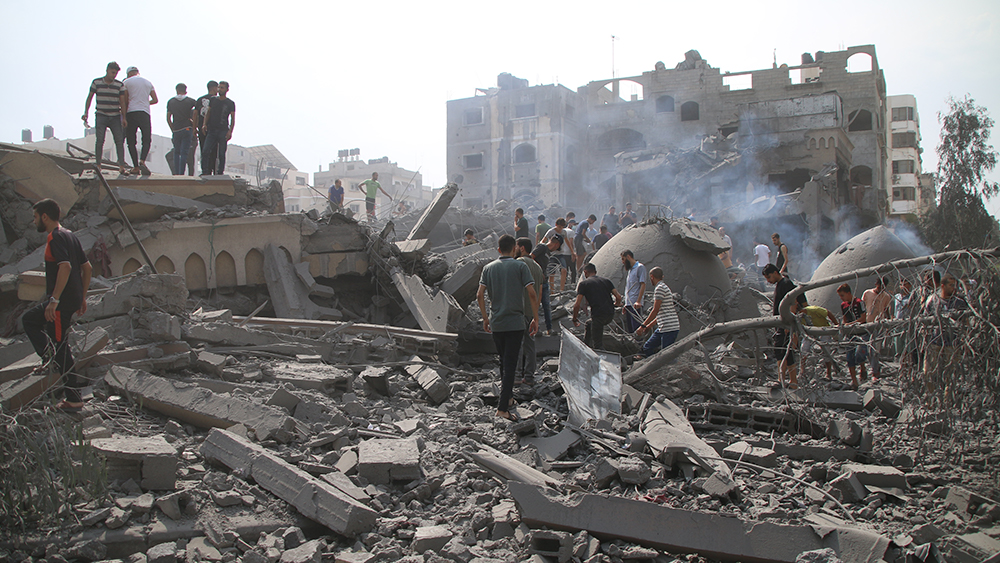 Parler
Parler Gab
Gab
- Gaza’s largest hospital, al-Shifa, shut down its dialysis ward due to Israel-blocked fuel shortages, leaving 350 kidney patients facing agonizing deaths.
- Medical staff describe turning away desperate patients, knowing they will suffocate from toxin buildup without treatment.
- Israel’s attacks and blockade have destroyed 6 of 7 dialysis centers, killing 41% of kidney patients since October 2023.
- Families report loved ones struggling to breathe, forced to travel miles over rubble for unavailable care.
- Israeli authorities deny fuel access despite UN warnings, as patients die slow, preventable deaths in collapsing hospitals.
Hospital runs dry as Israel tightens the noose
With fuel reserves exhausted, generators powering dialysis machines at al-Shifa sputtered to a halt, forcing doctors to turn away desperate patients. "Kidney failure patients came today, and we painfully had to ask them to go back home," said Dr. Muhammad Abu Hassira, a nephrologist at the hospital. "This has very serious repercussions on their health." The shutdown is a death sentence for Gaza’s most vulnerable. Dialysis is not optional; without it, toxins accumulate in the blood, causing seizures, organ failure, and, ultimately, suffocation as fluid drowns the lungs. But Israel, in its relentless punishment of civilians, has choked off the fuel, water, and medical supplies required to sustain these patients. According to Gaza’s Health Ministry, 728 kidney failure patients remain in the territory, half of whom relied on al-Shifa’s 30 dialysis machines. Even before the shutdown, sessions were cut from the standard 12 weekly hours to just four, which is barely enough to stave off death. Now, they receive nothing.A health system dismantled piece by piece
Israel’s systematic dismantling of Gaza’s healthcare infrastructure has turned hospitals into graveyards. Six of the Strip’s seven dialysis centers have been destroyed in military assaults, including the Noura al-Kaabi facility bombed in June. A staggering 41% of kidney patients have perished since the war began—not from bombs, but from preventable neglect, as toxins slowly poisoned their bodies without treatment. The crisis is compounded by Israel’s blockade on clean water. Nearly 90% of Gaza City’s water wells and all desalination plants lie in ruins, leaving medical staff scrambling to secure sterile water for dialysis. Sometimes, sessions are canceled due to a lack of water. d. For families, the collapse of care is a waking nightmare. Ahmed al-Sayed, whose grandmother depends on dialysis, described her agony when sessions are missed: "She feels suffocated, struggles to breathe… it won’t be long before she dies." Transportation is another hurdle; with fuel banned, ambulances are scarce, and patients like 54-year-old Mohamed Attiya must be wheeled for miles over bomb-cratered roads. "The occupation does not care about the suffering or the sick," Attiya told the AP, his body swollen with untreated waste. While the UN warns of a "catastrophic" collapse, Israeli officials coldly deflect blame. COGAT, the military body coordinating aid, claims medical supplies are "approved for entry," yet records show 14 denials of fuel access to northern Gaza in May and June alone. Meanwhile, dialysis patients perish in slow motion, ignored by governments and media alike. "The shutdown of the dialysis unit at al-Shifa Hospital today means the imminent death of hundreds of patients," Dr. Abu Hassira said. "Some patients’ condition will already begin to deteriorate today because they missed their dialysis session, while most of them only have two or three days before their condition worsens, and then they will start dying." This is not war. This is industrialized murder. Israel’s blockade has transformed hospitals into tombs, condemning civilians to torturous deaths for the "crime" of living under bombardment. As Gaza’s healthcare system collapses, the world’s silence echoes like a verdict: these lives were never going to be saved. Sources for this article include: MiddleEastEye.net APNews.com MiddleEastMonitor.comBy S.D. Wells // Share
Devastation in Central Texas: Camp Mystic tragedy unfolds amid flash floods
By Belle Carter // Share
Survival 101: A comprehensive guide to staying safe during a school shooting
By Zoey Sky // Share
Trump’s tariffs spark global trade revolt: BRICS nations accelerate dollar-ditching plans
By Finn Heartley // Share
Trump orders more weapons for Ukraine after Russia’s largest aerial assault since 2022
By Cassie B. // Share
By Finn Heartley // Share
Governments continue to obscure COVID-19 vaccine data amid rising concerns over excess deaths
By patricklewis // Share
Tech giant Microsoft backs EXTINCTION with its support of carbon capture programs
By ramontomeydw // Share
Germany to resume arms exports to Israel despite repeated ceasefire violations
By isabelle // Share










